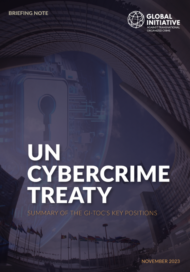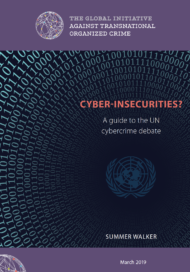Posted on 27 May 2022
At this year’s session of the UN CCPCJ, tensions around Russia simmered, with occasional flare-ups, and concerns were voiced over restrictions on civil society access to UN crime discussions. Meanwhile, member states made tentative steps towards a new legal instrument on wildlife trafficking, and there was much focus on cybercrime and online child sexual abuse.
From 16-20 May, member states and non-governmental organizations met in Vienna for the 31st session of the UN Commission on Crime Prevention and Criminal Justice (CCPCJ). This was the first CCPCJ session – the UN’s annual crime policy get-together – to take place with in-person participation since the COVID-19 pandemic struck. It was also the first since the Russian invasion of Ukraine began earlier this year, and since the beginning of the UN process to negotiate a new legal instrument on cybercrime.
The UN crime gatherings have become a bit of a battleground in their own right of late. In 2021, the CCPCJ event was marred by political disruption around a dispute between Armenia and Azerbaijan, while its sister body (the Commission on Narcotic Drugs) in March experienced wrangles and disruption as the war and the divisive cybercrime discussions converged. This followed the UNCAC Conference of Parties in December 2021, which faced political clashes over civil society participation (which are still yet to be resolved). By contrast, this CCPCJ managed to proceed in a more consensual fashion, including adopting a resolution that paves the way to a potential new protocol to the UNTOC on illicit wildlife trafficking, as well as another text focused on improving prevention of and responses to online child sexual abuse.
First steps towards a new wildlife protocol to UNTOC
Angola, Kenya and Peru tabled a resolution seeking to start the process for a new protocol to the UNTOC on illicit trafficking in specimens of wild fauna and flora, an issue that has been discussed and promoted by civil society groups for many years, most recently by the Global Initiative to End Wildlife Crime, led by former CITES Secretary General John Scanlon. Despite some scepticism that was evident before and during the negotiations, particularly among Western states, the final text of the resolution triggers the process that will potentially lead to a new protocol. Member states – but, notably, not civil society groups – are invited to submit to the UN Office on Drugs and Crime (UNODC) their views on ‘the potential of an additional protocol to the UNTOC, to address any gaps that may exist in the current international legal framework to prevent and combat illicit trafficking in wildlife’.
There were extensive discussions during the negotiations on the types of crime that should be addressed in this process, and delegates ultimately settled on the flexible wording of ‘wildlife’ (which can be interpreted in different ways by member states), as opposed to the original more specific proposal of ‘wild fauna and flora’. There were attempts by others to steer the crime types included towards the CCPCJ’s agreed term of ‘crimes that affect the environment’, which would have given the process less clarity given the lack of shared understanding of what activities this would cover.
The adoption of this resolution shows that the international community recognizes illicit wildlife trafficking as a priority issue, and that there is a need to consider how the international legal framework can be updated. But there is by no means consensus on whether a fourth protocol to UNTOC would be an effective or desired way of responding. Clearly, member states will be free to send their views on whether or not they think a new protocol is a good idea, but the step of starting this process at least lends momentum to the idea and will require governments to seriously assess the prospect, which was not necessary as long as the idea remained a civil society-led advocacy campaign.
And as this moved forward at the UN, another campaign to tackle crimes detrimental to the environment in a broader sense made its mark in the margins of proceedings. At a side event, the Stop Ecocide Foundation advocated criminalizing ‘ecocide’ (destruction of the natural environment by human activity) through the International Criminal Court.
UNTOC review mechanism delays and difficulties continue
While the possible additional protocol to UNTOC will now be considered, there was less discussion on the effectiveness and impact of the ‘mother convention’ and its existing protocols. It is almost two years since the much-delayed Implementation Review Mechanism was officially started (and 22 years since the UNTOC was adopted). Progress is slow, and transparency and civil society access remain issues that hinder our ability to understand the progress and impact of implementation. A recent update by the UNTOC Secretariat reveals that ‘[a]s of end-April 2022, out of the 62 Reviews of group one, only 31 reviews are currently advancing’. In short, this means that the mechanism is falling far behind its intended schedule, and therefore data and evidence on implementation are not yet being produced.
However, discussions on UNTOC during the CCPCJ did not address this concern; rather countries and regional groups re-stated their commitment to the UNTOC and its review mechanism, and emphasized its importance (the only sign of discontent was a claim made by a Russian delegate to the effect that Slovakia was refusing to review Russia). That civil society is excluded from various stages of the review as member states make use of their apparent power to veto the participation of specific NGOs in the state–civil society ‘Constructive Dialogue’ process, indicates troubled waters ahead for the review mechanism. The issue of civil society access will no doubt come to a head in the context of the October 2022 Conference of Parties of the UNTOC, which will be taken into account as states consider and submit their views on a new protocol.
Cybercrime and online child sexual abuse
The theme of this CCPCJ was cybercrime: ‘Strengthening the use of digital evidence in criminal justice and countering cybercrime, including the abuse and exploitation of minors in illegal activities with the use of the Internet.’
The UK tabled a resolution aimed at improving responses to sexual exploitation and abuse of minors, focused mainly on the online environment. The adopted resolution encourages countries to enhance the prevention, detection, reporting and removal of online child sexual exploitation and abuse material in various ways: through police cooperation, by working with the private sector and by developing common understandings of terminology and datasets. The resolution has focused the Vienna diplomatic community on this issue as they warm up for the next session (30 May to 10 June) of the UN Ad Hoc Committee, which is negotiating a new legal instrument on cybercrime.
During the plenary debates on the CCPCJ’s theme, delegations and civil society were able to discuss both the ongoing treaty negotiations and online child sexual abuse and exploitation. The coming months will reveal how the Ad Hoc Committee negotiations will respond to these issues put forward through this resolution adopted at the CCPCJ.
UN Crime Congress in 2026, but no takers to host it
The Crime Congress has relevance and importance as a forum for exchange between member states and civil society on overarching UN and national responses to organized crime. Normally shortly after the Crime Congress, a new host country is found for the next one five years later. This time, following the 2021 congress in Kyoto, the CCPCJ were only able to agree on a new date, not a host country.
That there is not yet a country willing to take a leadership position (and, of course, foot the bill) for the next congress could well be a reflection of the strains placed on the diplomatic system in Vienna by the burden of meetings and conferences under the UNODC, coupled with other conflicting, high-priority issues and geopolitical tensions that governments currently face.
The GI-TOC contributed at the session with a range of events and statements. Click here to access the recordings on our YouTube channel.



